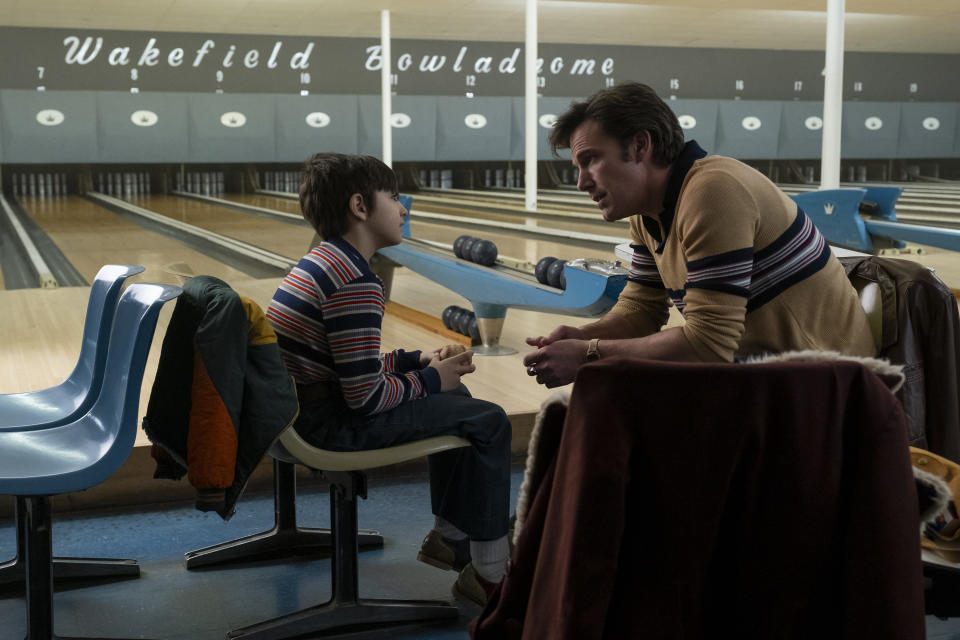Does Anyone ‘Deserve’ an Oscar? It’s Complicated

- Oops!Something went wrong.Please try again later.
- Oops!Something went wrong.Please try again later.
- Oops!Something went wrong.Please try again later.
What makes a movie “Oscar-worthy”? The most cynical answer to this question is that it comes down to campaigning, but the more troubling one goes one step further: The Oscars are a popularity contest, and the strongest candidates speed to the front of the pack simply because they’re overdue for the recognition.
The Academy, which wraps up its first round of voting this week, should consider the impulses behind each vote — especially when it comes to the four performance categories, where familiar faces often benefit the most from aggressive campaigns. Should the Oscars reward actors for taking the craft in exciting new directions — or should they do it for the sake of entitled movie stars who want validation and cred?
More from IndieWire
What the BAFTA Nominations Mean for the Oscars: Watch Out for Lady Gaga
Searchlight Loves the Hulu Opportunity but the Box Office Future Remains Unclear -- Q&A
That seemed to be the logic of George Clooney’s case for his pal Ben Affleck’s supporting turn in “The Tender Bar.” In an interview last week with Deadline, Clooney turned heads when he made the case that Affleck’s performance in the movie, which Clooney himself directed from J.R. Moehringer’s memoir, deserved a gold statue for playing Uncle Charlie, the wise-cracking bar owner and literary guru who inspires the young protagonist’s ambitions as a writer.
The problem with that assertion: it gets in the way of a legitimate argument for movies and performances that deserve Oscars because of the specific impact those wins can have on conversations about the type of work this industry should support. Oscar wins can help with future employment, of course, but they also encourage more storytelling akin to the work that wins. So if you care about good movies, you should be rooting for the right frontrunners in every category.
Those aren’t the metrics Clooney was putting into action when making the case for Affleck. “He knows what it’s like to be at the top of the game, and he also has had some rough patches,” he said. “Some of them, as he has said many times, self-inflicted, but he’s a fighter, and he’s been out there, and he showed up on this one in such a big way and in such a gracious way, and he’s been doing it for a bit, and it’s fun to see the reactions towards him, and it’d be lovely if the same sort of attention was carried on [to the Oscars]. I think he would deserve it.”
There’s a lot to unpack in that, including the possibility that Clooney truly meant to express the way Affleck has channeled his struggles with alcoholism and rocky career moves into a worldly bartender with a rough edge. Truth be told, Affleck is the sole strength of “The Tender Bar,” an otherwise routine, amiable coming-of-age story that doesn’t leave much of a lasting impression. (Clooney’s eclectic directing career, which began 20 years ago with the bonkers Charlie Kaufman-scripted “Confessions of a Dangerous Mind,” has followed its own unpredictable rocky road to rival Affleck’s creative journey, but that’s a different conversation.)

Claire Folger/ © 2021 Amazon Content Services LLC
In any case, Affleck doesn’t “deserve” an Oscar for delivering a serviceable turn in an unremarkable movie. The Oscars may sometimes turn into a popularity contest, but that’s not the sole metric under which they should be judged. Oscar worthiness has symbolic value for the state of cinematic storytelling at any given moment. Films and performances deserve Oscars not only because they represent singular aesthetic achievements, but because an Oscar win can actually catalyze positive change for the creative forces involved.
Affleck’s been down that road twice now, going back to his memorable Best Screenplay win with Matt Damon for “Good Will Hunting” in 1998 and continuing with his “Argo” Best Picture win (though snubbed for Best Director, Affleck won as a producer, sharing the prize with…George Clooney). Based on his rigorous campaigning, Affleck really wants to win a third trophy, but he’s obviously a dedicated artist who will be fine with or without it.
It’s also worth noting that his superior 2022 performance was the hedonistic count who attempts to manipulate a medieval #MeToo scenario in Ridley Scott’s underappreciated “The Last Duel.” Adorned in a blond goatee and a demented grin, the actor turns the potential for a stagy medieval drama into a pitch-black comedy. A win there would at least prove that the industry wants to see that kind of adventurous swing even if it turns out to be box office poison. (Affleck himself has admitted that “The Last Duel” would have been better suited as a straight-to-streaming release.)
As for “The Tender Bar,” the proverbial “it’s his time” argument that comes up for veteran performers in Oscar campaign mode is a bit specious, in large part because it strikes such a contrast to contenders that more naturally fit that argument.

As a point of contrast, two women come to mind whose nomination prospects aren’t nearly as firm as they should be: Kristen Stewart and Penelope Cruz. In “Spencer,” Stewart delivers a mesmerizing performance as Princess Diana that transcends the obvious lure of an impersonation and instead takes the form of a poetic meditation on the woman’s representational power as single-minded figure willing to buck the powerful hierarchy around her. It’s a riveting turn rich with ambiguity, a trait it shares with Cruz in Pedro Almodovar’s poignant meditation on the Spanish Civil War.
Cruz is so closely tied to Almodovar’s filmography that she’s essentially an extension of his artistic ambition; with “Parallel Mothers,” she’s the conduit that takes this ominous tale of motherhood and intergenerational romance into a deeper rumination on the repression at the center of Spanish identity. These performances deserve Oscars (hell, make it a tie!) because they show the potential of film performance to work in tandem with artistry behind the camera, as opposed to the case of “The Tender Bar,” where Affleck’s agreeable turn stands out like a sore thumb of conventional narrative beats.

Courtesy of the Venice Film Festival
Of course, like Affleck, Cruz already won an Oscar. That shouldn’t negate her opportunity in this particular case for another reason: Not enough people saw “Parallel Mothers.” The movie flopped in theaters in the midst of the Omicron wave last December, providing the latest reminder that — like Campion — Almodovar’s status as one of our greatest working filmmakers is never enough to guarantee an audience for his work. It’s a beautiful struggle to make movies like this, and they need all the help they can get to stand out.
Which brings us to “Nightmare Alley.” Guillermo del Toro’s moody rumination on a classic pulp novel finds Bradley Cooper as a Depression-era charlatan on a self-destructive path to his own comeuppance. It’s a peculiar movie to follow del Toro’s Oscar juggernaut “The Shape of Water,” in part because it trades ethereal romanticism of that crowdpleaser for more unseemly observations about masculine power and the manipulative impulses at the root of modern society. However, it shares that DNA with “The Power of the Dog,” and both movies essentially come down to a very bad man facing up to his sins with karmic justice of the very best kind.
In del Toro’s film, the narrative weapon in play is a career-best performance by Bradley Cooper, whose face in the last shot stands out as some of the finest screen acting of the last year. Cooper had a rough go on the campaign trail on “A Star Is Born,” for which he showed formidable talent behind the camera, but outdoes his performance there with this grimy, unsentimental turn — proof that even wealthy, famous performers can take dangerous swings at uncertain material and emerge unscathed. Hollywood would be better if more of them gave it a shot.
Or can they? In the wake of the movie’s box office failure (and ahead of its incredible re-release in black-and-white last week), Cooper said in a recent KCRW interview that the changing economics of the industry made him question his future career prospects in the industry.
Yes, Cooper has already completed his next directing credit (Leonard Bernstein biopic “Maestro”) and it’s hard to imagine that he really needs to crank out big commercial hits to sustain this stage of his career, but the message stings nonetheless: It’s hard to justify challenging material when so much of the world turns its back. If there was any worthy performance that deserved an Oscar, it might be this one, if only to prove that feeling wrong.
Best of IndieWire
2021 Emmys Winners List: 'Ted Lasso,' 'The Crown,' and 'The Queen's Gambit' Lead the Night
2021 Emmy Predictions: Who Will Win at the Primetime Emmy Awards?
Sign up for Indiewire's Newsletter. For the latest news, follow us on Facebook, Twitter, and Instagram.

